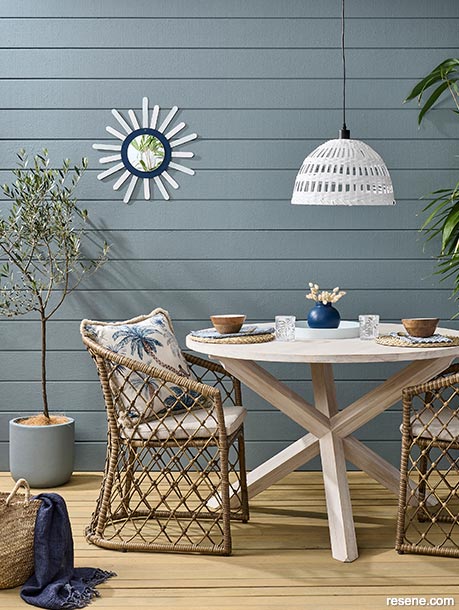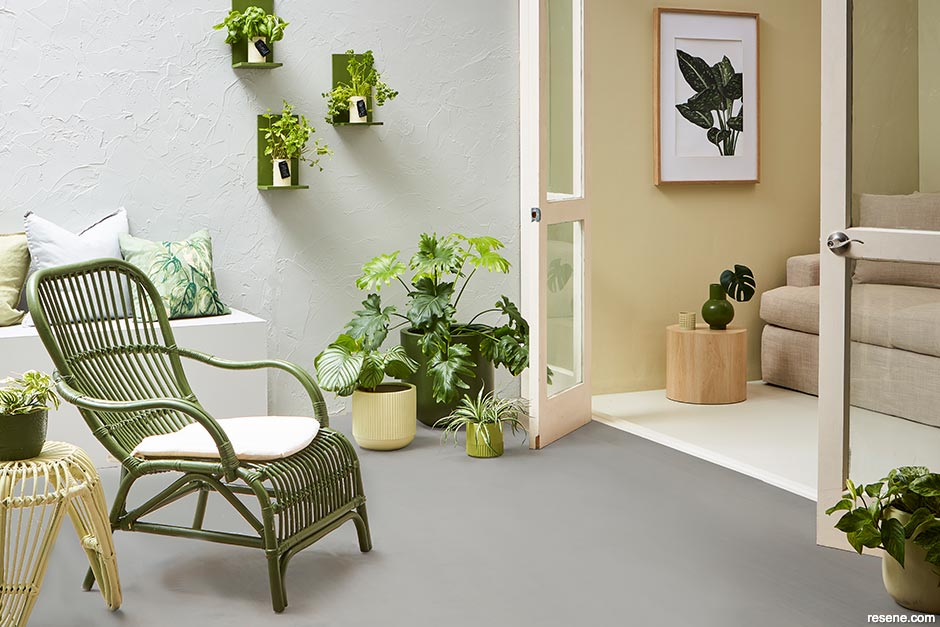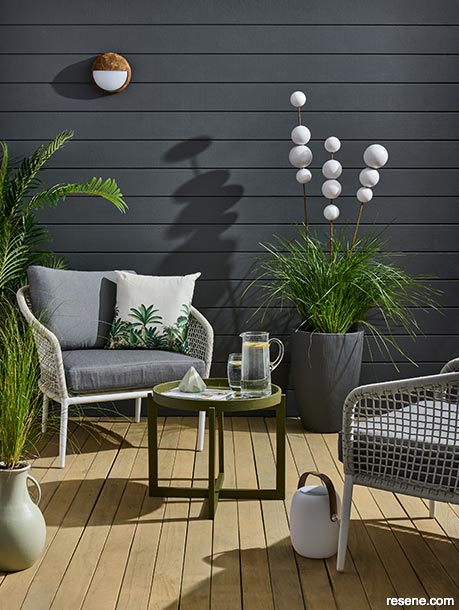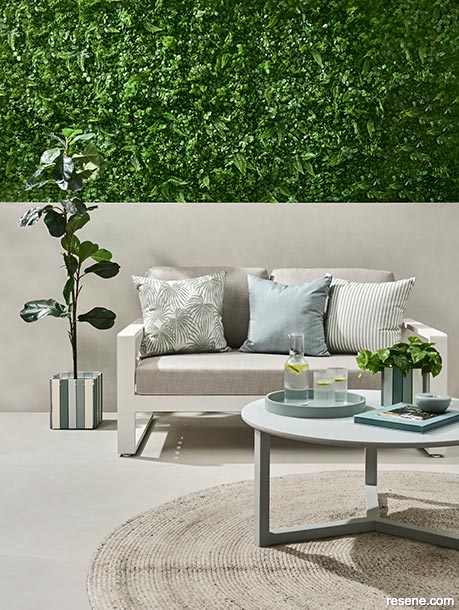From the Resene decorating blog
Have you ever thought about the sun and weather protection your home’s painted ‘skin’ needs to help ensure it stays in top condition?

Regular cleaning is a must to protect your exterior paint from the sun and sea.
These weatherboards are painted in Resene Baring Head with decking stained in Resene Woodsman Uluru, DIY wall art in Resene Alabaster and Resene Ocean Waves, planter in Resene Baring Head, light fitting in Resene Alabaster, vase in Resene Ocean Waves and tray in Resene Timeless. Table, chairs and cushion from Danske Møbler, basket from Bed, Bath & Beyond, throw from Furtex, tableware from Good Thing. Project by Melle Van Sambeek, image by Bryce Carleton.
We’ve all caught on to the importance of being sunsmart when it comes to protecting ourselves, and our skin from the heat of summer sun. We’ve all been trained to ‘slip, slop, slap’ for sun protection, but have you ever thought about the sun and weather protection your home’s painted ‘skin’ needs to help ensure it stays in top condition?
Resene Paint Experts Bryce McDermott and Jay Sharples offer their tips and advice on the best ways to protect and preserve painted and stained surfaces around your home and bach so they come through summer looking their best.
Bryce: Paintwork should be gently washed down at least once a year to remove any surface contamination, dirt and dust. Use Resene Paint Prep and Housewash, being careful to wash it off glass or aluminium while it’s still wet as it can etch certain surfaces. This will increase your paint’s lifespan.
Jay: Realistically, the more often you clean and remove contaminants from the surface of the substrate the longer the coatings will last. We have slow-acting cleaners like Resene Deep Clean that can be good to use 2 or 3 times a year to keep things looking good, and faster-acting cleaners like Resene Moss & Mould Killer, Resene Paint Prep and Housewash, Resene Bio-Cleaner, Resene Heavy Duty Paint Prep and Oil Remover, that are good to use at the start of summer or whenever you want a more instant clean.
Bryce: Stains, by their nature, won’t last as long as paint, particularly in coastal conditions. We recommend a maintenance coat every two summers especially on very exposed areas. Wash with Resene Timber and Deck Wash before you start which will remove the old decayed stain and open up the timber fibres so the wood takes the stain more readily. When you’re re-staining make sure you use the same stain as that already on the wood. Some different stains are not compatible. Consider covering outdoor furniture when it’s not in use with good airflow so it doesn’t get mouldy. Leaving it exposed to the elements will shorten its life. Read the manufacturer's advice for how to maintain your furniture and keep it looking good.
Jay: Different products have different recommendations for how often you need to recoat times and to maintain them. We recommend you recoat Resene Woodsman natural wood stain range recommendation around every couple of years, depending on the condition, location and environment. That might mean one maintenance coat or you may need to apply two or even three coats. It will depend on if you keep up with the regular maintenance or you decide to leave it longer. If you do the maintenance regularly, it can be quite quick to do, compared to leaving it for a long time and having to do a lot more prep and coats.

Bryce: The best thing you can do in coastal areas is to wash down exposed surfaces on a regular basis to remove salt deposits, although this can be trickier if the house is on tank water. If water is limited, focus the most attention on the side that is most prone to the salt. Metal brackets, nails and clips may rust very quickly so replace badly corroded items with new stainless-steel items where you can but even then, keep an eye on things. Stains will need more frequent recoating in coastal conditions.
Jay: Regular clearing is key to remove surface contaminants. Windblown salts can travel 25km inland, so a lot of the country could almost be considered coastal. If you’re within 300m of the sea, aim to clean your home’s exterior twice a year. The other tip would be to stick to the recommended spreading rate (found on the label of your Resene paint) when painting to ensure enough product is being applied.
Bryce: Wash down when you can in cooler parts of the day but pay particular attention to timber areas that can warp under moisture followed by extreme heat. Maintain areas that have cracked and peeled, by sanding, spot priming and recoating. Keep a record of the colours you’ve used. Resene’s CoolColour technology allows more of the infra-red heat to be reflected out of the painted surface which in many cases will help prevent or reduce the risk of cupping and cracking of timber. Resene ColorShop staff can offer advice on the colours and products suited to your conditions.
Jay: For more exposed areas that spend a lot of time in direct sunlight, think about colour selection. Darker colours will absorb more heat which can potentially lead to coating and substrate issues. Resene CoolColour Technology helps to reduce the amount of heat absorbed into a substrate but it doesn’t eliminate the potential of heat related issues entirely. New building materials will likely have LRV (Light Reflectance Value) restrictions so I’d recommend checking before you paint. Also, if you spend a lot of time barefoot, choosing darker colours for your deck or patio isn’t always the best option as it can get too hot to walk on in the height of summer. You may want to opt for a light to mid-range colour instead as very white or light decks can end up glary.

Ask for a Resene CoolColour when using a dark shade on your home exterior, as it will help reflect more heat and protect the substrate.
These weatherboards are painted in Resene Nocturnal with decking stained in Resene Woodsman Uluru, table in Resene Waiouru, large pot in Resene Nocturnal, wall light in Resene FX Faux Rust Effect and bubble stakes in Resene Alabaster. Chairs and table from Danske Møbler, cushion and radio from Good Thing, plant from Adairs. Project by Melle Van Sambeek, image by Bryce Carleton.

Don’t be tempted to paint exteriors in the full sun. Work in the cooler part of the day hours and follow the sun around the area.
This wall and floor are painted in Resene Triple White Pointer. The wall has been topcoated with Resene Carrara mixed with Resene FX Paint Effects Medium for a tonal effect. Table in Resene Duck Egg Blue, tray and tealight holder in Resene Inside Back, DIY pot and planter in Resene Thor, Resene Duck Egg Blue, Resene Cararra and Resene Inside Back. Sofa and rug from Outdoor Space, carafe and cushions from H&M Home. Project by Vanessa Nouwens, image by Bryce Carleton.
Bryce: Don’t paint in really hot weather if you can avoid it. The best advice is to follow the shade around. Start early ahead of the sun and take a break when the sun’s at its hottest. Not only will that help the paint, but it will help you to avoid sunburn too.
Jay: Use Resene Hot Weather Additive in your waterborne paints. This will slow the drying time and help with the flow of the paint. It will also increase the wet edge time to help you achieve a much better finish. This means not letting the paint dry on one area before painting the next, so you get a seamless blend.
Bryce: Roofs are exposed basically all the time to all sorts of conditions. Choose our Resene Summit Roof Paint in a CoolColour to reduce heat absorption compared to the standard colour. Get up there and wander around occasionally to check for moss and lichen and get rid of it if you find any. Give the roof a wash down if you think it needs it. If you’re using any kind of chemical wash just remember to disconnect the downpipes to keep chemicals out of the stormwater system. Remember to make sure you use the appropriate safety gear to avoid falling off your roof. Never walk over wet paint or stain – it’s slippery! Instead plan your painting so you don’t need to walk over already wet areas.
Jay: Regular cleaning and keeping the surface free from contaminants goes a long way to maintaining the coating and protecting the area. While cleaning you will notice areas that may need maintenance so it will help you keep on top of that. Edges and areas angled to the sun are the most common places that need the most maintenance. Touching up small areas can take an hour or two, leaving it and doing nothing can result in a full strip and repaint which will take much longer.
If you’re planning to use bright colours outside, you can help keep their colour vibrant for longer with Resene Clearcoat UVS. This is a gloss clear finish designed to be applied over bright colours to help protect against UV.

October 23, 2023
Resene staff can help you with any prep, paint or colour questions and give you advice for whatever project you’re working on – either visit your Resene ColorShop or Ask a Resene Paint Expert online.
Book a colour consult | Ask a Colour Expert | Ask a Paint Expert
Resene's decorating blog
Paint your home beautiful! Discover the latest decorating trends, tips and colour news.